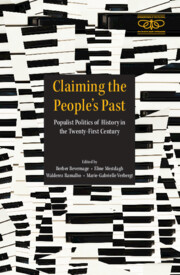Book contents
10 - Populism, Presentism, and the Prospects of Critical Historical Thinking in Russia
Published online by Cambridge University Press: 15 May 2024
Summary
The ability to hear and understand the people, to see them through and through, to the full depth, and to act in accordance is the unique and main virtue of the Putin state. It is adequate to the people, along with the people, which means that it is not subject to destructive overloads from the counter currents of history.
—Vladimir Surkov (2019)Introduction
The current Russian government is revising the constitutional system and essentially curtailing the work of democratic institutions. In the process, it is increasingly turning to history as a means of self-legitimation. During the 1990s, which were difficult years for the economics of the country, ruling elites showed an indifference to history. Since the early 2000s, however, this indifference has been replaced, in the words of Alexey Miller, with ‘the escalation of historical politics’ (Miller 2012: 255), which has reached its peak in the third and fourth terms of Vladimir Putin's presidency. The authorities impose a correct picture, from their point of view, of the historical past with the help of school textbooks, large-scale multimedia projects, such as ‘Russia: My history’, and memorial laws (Koposov 2017: 207–299; Kurilla 2021), and even recently adopted amendments to the constitution.
In this chapter, I analyse the Russian government's uses of history. The chapter is divided into three sections. In the first section, I discuss two theoretical questions: First, can the Putin regime be considered populist, and, if so, what are its defining features? Second, what uses of history are characteristic of contemporary populism and its Russian variant? I will claim that Russian uses of history can be characterized as conservative, drawing on a particular kind of presentism. After David Armitage, I would call this ‘teleological presentism’ (Armitage 2020). In the second section, I will show how this essentially conservative regime of historicity works in the Russian context by focusing on the use of the idiom ‘historical Russia’. This phrase is increasingly used today in official rhetoric when explaining domestic and foreign policy agendas. In the third and final section, I present my vision of an alternative historicity, which could become a challenge for the kind of presentism produced by the current Russian government.
- Type
- Chapter
- Information
- Claiming the People's PastPopulist Politics of History in the Twenty-First Century, pp. 192 - 208Publisher: Cambridge University PressPrint publication year: 2025

